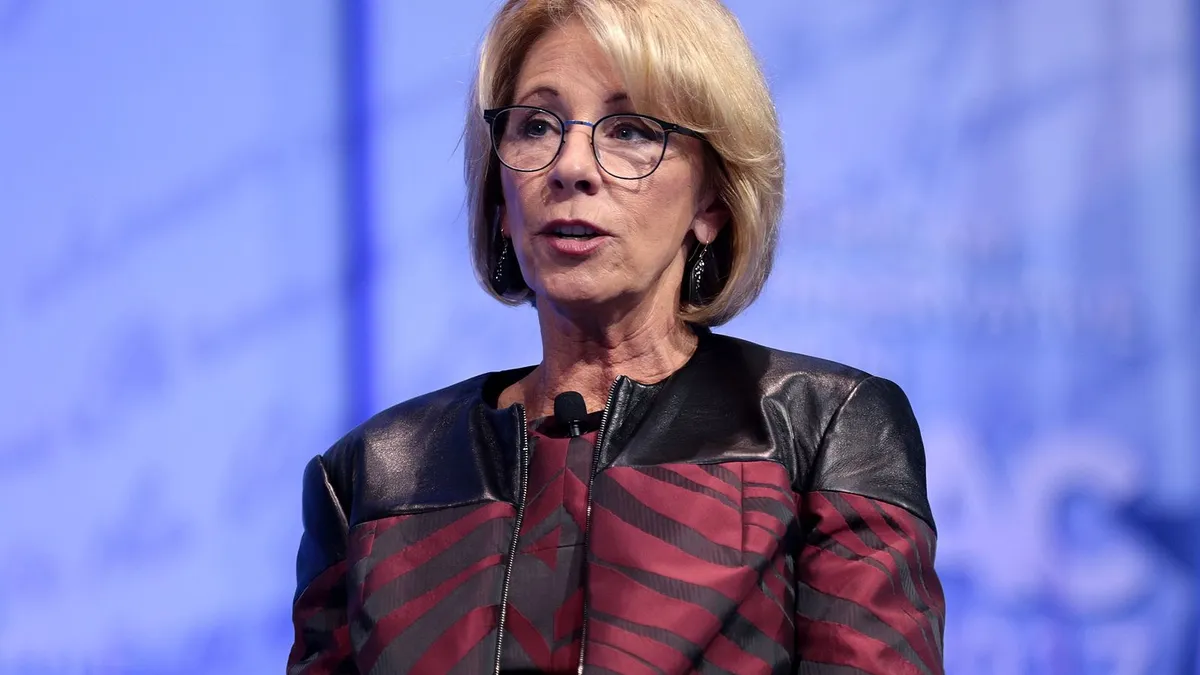Dive Brief:
- The leaders of 15 prominent higher education groups are asking U.S. Secretary of Education Betsy DeVos to delay her new rule governing campus sexual violence.
- In a letter sent to DeVos Wednesday, they argue the rule's Aug. 14 effective date comes too soon in the midst of the pandemic, citing an executive order that asks agencies to pull back on regulations that could inhibit economic recovery.
- Many in the sector have said implementing the Title IX regulation by mid-August will be challenging, pointing out that many other department rules take effect a year or so after they're finalized.
Dive Insight:
Higher ed leaders nationwide balked when DeVos announced last month that the new rule would go into effect in August — a turnaround they say is astonishingly tight for such a complex measure, particularly amid a global health crisis.
The regulation on Title IX, the federal law barring sex discrimination on college campuses, replaces guidance issued under the Obama administration. The rule has been criticized by advocates of sexual assault survivors, who disapprove of several of its provisions. It requires colleges to hold live, courtroom-style hearings to judge the merits of a sexual misconduct complaint, and it narrows the cases colleges would need to investigate.
Critics of the Obama-era policies, however, have said DeVos' rule corrects a process that is biased against accused students.
Department spokesperson Angela Morabito said in a statement that the rule "should come as no surprise." The department proposed the rule in 2018 and solicited public comments, she added. Schools are still receiving Title IX complaints, and "[t]o pretend otherwise is to let students down."
The letter does not comment on the merits of the rule. Rather, it points out that colleges face ruinous financial losses — collectively in the "tens of billions of dollars" — related to the pandemic, and that those losses will accelerate in the coming academic year.
Campus officials are also busy determining how to safely reopen campus, the leaders wrote, which includes measures that could be costly. Some schools have proposed changes such as housing one student per dorm room or modifications to classrooms. Indiana's Purdue University, for instance, will add mobile plexiglass barriers in front of instructors as an extra layer of protection.
"This is an all-hands-on-deck effort, touching every campus administrative function and department," the letter reads. "Now is not the time to add to these burdens by requiring campuses to implement the most complex and challenging regulations issued in the Department's history."
Extending the rule's effective date to at least Dec. 21 would allow campuses to adjust in the fall semester and use the time "to more sensibly and effectively incorporate the requirements of the final rule," the leaders wrote.
They also note that changing the timeline could expedite pending lawsuits against the Education Department by 19 states, which have moved to stop the regulations from taking effect in August.
The department "affirmatively" taking this step allows the parties involved in the lawsuits to focus on other aspects of the case, they wrote.
Editor's note: This article has been updated to include a comment from the U.S. Department of Education.














